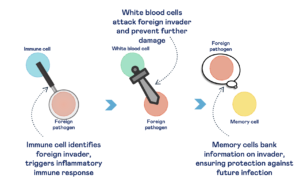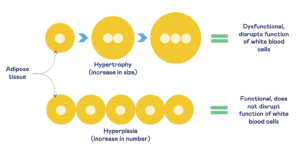Jump to: Three ways obesity and type 2 diabetes impact our immunity | How our immune system works | How obesity impacts our immune system | How type 2 diabetes impacts our immune system | Take home message
The link between obesity and chronic diseases such as type 2 diabetes and heart disease is well established. More recently, researchers have also started looking into the impact of excess body fat and poor blood sugar control on our immunity and the body’s ability to fight infections.
The covid-19 pandemic sparked further interest in this complex relationship, with research showing that individuals living with obesity and type 2 diabetes were more at risk of severe complications of covid-19.
- Inflammation: Enlarged fat cells, often seen in people living with obesity, become dysfunctional and release harmful compounds, which we call cytokines, into the blood that increase inflammation and disrupt the balance of immune cells in the body. High blood sugar levels also increase inflammation levels.
- Leptin resistance: Leptin is a hormone released by our fat cells that have key functional roles in our metabolism. Leptin also seems to have a role in managing essential functions within the immune system. When we become leptin resistant due to obesity or type 2 diabetes, leptin can no longer interact with various immune cells to support their function.
- Lower phagocytosis (pronounced ‘fago-si-toe-sis’) activity: Phagocytosis is a bit like the game Pacman. Immune cells called macrophages, eat up foreign pathogens (viruses), break them down, and remove them. This is a crucial part of our immune response. In type 2 diabetes, this process is suppressed, and immune function decreases.
At Second Nature, we’ve supported over 150,000 people to lose weight and lower their blood sugar levels.
If you’d like to improve your immunity, lose weight, and manage your blood sugar levels for the long term, click here to take our health quiz.
Otherwise, keep reading as we dive deeper into how our immune system works and how it’s affected by obesity and type 2 diabetes.
Medication-assisted weight loss with a future focus
Start with Mounjaro, transition to habit-based health with our support

1) How our immune system works
Inflammation
To understand how our immune system works (the study of immunity is called immunology), it’s essential to first understand inflammation.
Inflammation is our body’s response to damage. It’s an essential part of the healing process that enables our body to recover from injury, infection, and illness that cause damage to our tissues and cells. This response leads to swelling after an injury, for example.
Inflammation has received some bad press, with all major chronic diseases associated with high levels of inflammation. This has led to suggestions that the inflammation itself might be the cause of these chronic diseases.
However, if damage doesn’t occur in the first place, the body’s inflammatory response wouldn’t need to be triggered at such a high level.
The link between disease and inflammation is more likely to be a sign of excess damage. With excess damage to the body’s tissues and cells comes an exaggerated healing response in the form of inflammation. This is known as chronic low-grade inflammation.

Organs and cells
The immune system comprises a collection of organs, chemicals, and cells that play a role in the body’s inflammatory response.
While some are well known, like the involvement of white blood cells, others might not be as obvious, such as the role our tonsils play in stopping germs from entering the body through the nose and throat.
The primary responsibility of our immune system is to detect foreign pathogens or viruses within the body – like a strand of the influenza virus which causes the seasonal flu – and attack them to prevent damage to the body.
White blood cells are your body’s defence against these foreign invaders. Our white blood cells are made up of a range of different cells which each play a specific role in the immune response, such as B-cells, T-cells (which work with antibodies), and natural killer cells.
Remarkably, your body records every microbe it’s ever defeated through the action of a special kind of white blood cell known as (unsurprisingly) ‘memory cells’. These memory cells enable our immune system to recognise microbes in the future and quickly attack them to prevent damage.
This process is how many vaccinations work. The vaccine triggers our immune response by injecting a minimal amount of a virus into the body. Our memory cells then record this so they can attack the microbe faster in the future if it enters the body again.

Key points:
- When tissues or cells become damaged through injury, illness, or infection, the body responds by triggering inflammation
- Inflammation is the body’s ability to heal and regenerate after damage to its tissues and cells
- The immune system is a collection of cells, chemicals, and organs that are designed to identify a foreign pathogen, microbe, or infection.
- The central part of your body’s immune response is your white blood cells, which include B-cells, T-cells, and natural killer cells.
- Once a foreign invader has been identified, different white blood cells will attack it to protect the body from further damage.
- Your body records every microbe it’s ever faced in cells known as ‘memory cells’, so it knows how to defeat the same microbe in the future.
- Vaccinations typically work by triggering your body’s immune response and allowing your memory cells to record how to defeat the microbe again in the future.
2) How obesity impacts the immune system
Our fat cells (technically termed adipocytes), collectively called adipose tissue, have two ways of storing excess fatty acids: growing in size (hypertrophy) or number (hyperplasia).
The size of our fat cells determines how well they function. If a fat cell grows too large, it becomes dysfunctional and produces excess secretion of proteins (known as cytokines), which prevents our white blood cells from working properly. Smaller fat cells don’t seem to have the same negative impact.

Adipose tissue inflammation due to the number of large dysfunctional fat cells is common in obesity compared to leaner individuals.
While lean people can also experience more large fat cells, leading to the same disruptions to their immune system, it’s not as common.
Leptin
One of the substances released by our fat cells is leptin. Leptin is produced by fat cells and has been described as our satiety hormone as it helps to regulate hunger and fullness.
Technically, leptin signals to the brain how much fat (lipids) we have stored in our body, which helps the brain know how much stored energy we have, which can trigger either hunger or fullness signals.
However, leptin also seems to have a role in supporting the function and production of certain types of white blood cells, particularly T-cells. T-cells and other immune cells have leptin receptors attached to them so they can communicate with each other.
When the amount of stored fat increases, adipose tissue secretes more and more leptin. This leads to a scenario known as leptin resistance, where the cells in the body don’t respond as well to leptin as they used to, resulting in a decrease in function.
Research in mice and humans has found that in obesity, when an individual becomes leptin resistant, it reduces T-cell function and increases the likelihood of infections and disease. Leptin seems to be a mediator in our immune system
You could consider leptin a bit like the oil to your car’s engine; with the right amount, it supports the engine to stay healthy and function well, but too much or too little disrupts the system and can lead to a breakdown.

Key points:
- Adipose tissue has two ways of storing excess fat: increasing cell size or number.
- The large fat cells within the adipose tissue become dysfunctional and secrete certain chemicals (known as cytokines) that prevent our white blood cells from functioning correctly.
- Fat cells secrete a hormone known as leptin, which appears to play an essential role in supporting the function of our white blood cells.
- In obesity, your body overproduces leptin and releases too much into the blood leading to leptin resistance. This means that leptin can no longer support our white blood cells effectively, and their ability to fight off pathogens and bacteria decreases.
3) How type 2 diabetes impacts the immune system
Type 2 diabetes is a condition where the body struggles to manage the energy we get from food effectively, we develop insulin resistance, excess fat builds up in the liver and pancreas, and our blood sugar levels rise over time.
Although it’s heavily linked to obesity, people at any weight can develop type 2 diabetes if they develop insulin resistance and metabolic syndrome.
While many issues associated with type 2 diabetes can impact our immunity, there seem to be two issues directly linked to the high blood sugar levels seen in people living with type 2.
Firstly, excess glucose (sugar) in the bloodstream appears to promote the release of proinflammatory cytokines that stop our immune cells from functioning correctly.
This is similar to the mechanism we discussed in obesity, where enlarged fat cells release too many of these cytokines.
Secondly, it seems that the high sugar levels in the bloodstream suppress an essential part of the immune response, a complicated biological process known as ‘phagocytosis’ (pronounced ‘fago-si-toe-sis’).
Phagocytosis is a bit like the game Pacman. It’s one of the final stages of the immune response where our immune cells will engulf their enemies, break down their parts, and remove their remains from the system.

Key points:
- Type 2 diabetes is a disease that can develop at any body weight, although people living with obesity are at a higher risk of developing the condition.
- People living with type 2 diabetes and those with obesity are more prone to infection.
- Type 2 diabetes increases the rate at which the body releases cytokines that become harmful in excess, dampening our immune response.
- Phagocytosis, a Pacman-like process in the body during the immune response, occurs at a much lower rate in people living with type 2 diabetes, harming our immune system.
Take home message
Our body’s immune response is a complex system comprised of multiple organs, chemicals, and cells initiated by inflammation – our body’s response to cell and tissue damage.
Our immune response is designed for hunting down foreign pathogens, bacteria, or microbes that have the potential to cause infections and disease and ‘destroy’ them.
How well our immune system functions are influenced by the amount of fat stored in our body, particularly how many large (hypertrophic) fat cells we have.
These large dysfunctional fat cells over-secrete certain chemicals that prevent our immune cells from working properly.
Type 2 diabetes and high blood sugar levels also interrupt our immune system by causing high inflammation and interrupting immune cell activity.
If you’d like to learn how to improve your immunity, click here.


